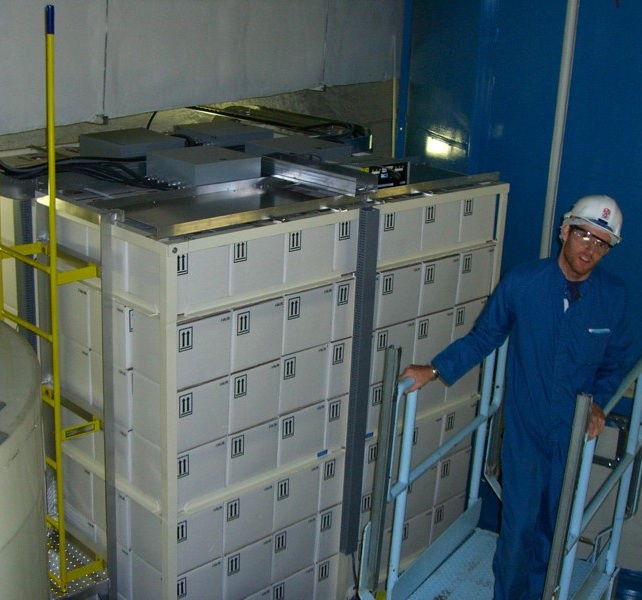c b krauss

Possible Thesis Projects (current as of Oct 14, 2024)
Please note that in the Winter 2025 admission round I will only accept students with full graduate scholarships.
Graduate Student Project with the Dark Matter Search Experiment PICO
PICO is a direct dark matter search experiment operated at SNOLAB in Sudbury, Ontario. PICO uses the bubble chamber technique with a refrigeration liquid C3F8 as active mass. The PICO-60 experiment took data between 2016 and the summer of 2017 with 41 litres of C3F8. This experiment was able to improve the sensitivity to spin-dependent dark matter interactions by a factor of 17. We are now operating the follow up experiment, PICO-40L, that tests a new technique if suspending the superheated bubble chamber liquid inside the detector. Students from the University of Alberta were playing an important role in the construction and are part of the team operating this detector. Possible MSc and PhD candidates will take on the analysis of the data from PICO-40L and determine background levels and ultimately try to find dark matter in our signal.
Other possible projects on PICO will be invovled with the design, construction and operation of the future PICO-500 experiment that the Alberta group is playing a major role in. The underground construction of PICO-500 at SNOLAB has started in 2024 and will be completed in 2026. Operation of the full detector is scheduled to start in 2026. Projects on this experiment will initially focus on the simulation of neutron and gamma radiation inside the setup and then progress to the operation and analysis of its data.
Some aspects of this work can be done at the University of Alberta, for other aspects travel to SNOLAB in Sudbury, Ontario can be arranged. You will also be able to participate in regular operation and maintenance of the experiment. A thesis on PICO will contain analysis of dark matter search data and should directly lead to a publication of new physics results.
Graduate Student Project on the P-ONE Project
P-ONE is a new neutrino experiment that we are developing for deplyment in the Pacific Ocean at a depth of about 2600m. This experiment will build on the experience we gained from the STRAW experiment that was delpoyed in the summer of 2018 and retrieved in 2023. This experiment provided data on the optical properties of the ocean water. We are using the extracted optical properties to simulate the P-ONE detector to optimize the geometry of the large P-ONE neutrino observatory. Students will have the opportunity to develop calibration and triggering algorithms, propose and simulate alternate geometries and analyse data. Typical projects involve travel to collaboration meetings and sometimes to the Ocean Networks Canada site in Victoria, BC. The group's interest is on the search and reconstruction of tau neutrino events and the study of high energy neutrino events in general. There are also projects involving the development and testing of hardware for P-ONE available. The trigger systems of P-ONE offer another interesting class of thesis projects.
If you are interested in these topics and would like to enter grad
school at the University of Alberta please contact me. Please also
have a look at this
page to
find out about the departmental requirements for graduate school
admission.
Please that these projects are only examples of the work that we are doing at the University of Alberta. PhD projects are more invloved than the described Master projects. Normally the student and supervisor define the scope of the thesis work together based on your individual skills and preferences and the projects requirements.
Undergraduate Student Projects
For all of the above projects we also have undergraduate student projects available. We have a particular focus on projects that involve working in our local labs, such as the development of electronic circuits for the calibration of P-ONE, the development of a new cleaning machine for the PICO-500 experiment or the assembly and operation of the new beta cage facility at the University of Alberta. We also offer simulation and analysis based projects on P-ONE and PICO for undergraduate students. We offer both payed, full term research positions in the spring and summer terms and volunteer positions during the whole year. If you are interested in volunteer research positions, please send your UofA transcript and a CV to me by email (link at the bottom of the page). Please contact me for details and to discuss opportunities that best match your interests and talents.
Here are a few examples of recent undergraduate research projects:
Simulation of the thermal conditions within the PICO-500 detector using finite element calulcations.
Development of a new online monitoring system for the PICO-500 detector.
Study of background events in the data of PICO-40L. This project requires a good comfort level with python.
Extraction of optical attenuation and scattering parameters in ocean water using the STRAW setup, impact of biofouling mitigation strategies on the neutrino senstiivty.
Analyzing testing data from the production of modules for the P-ONE setup (winter 2024, spring 2025).


